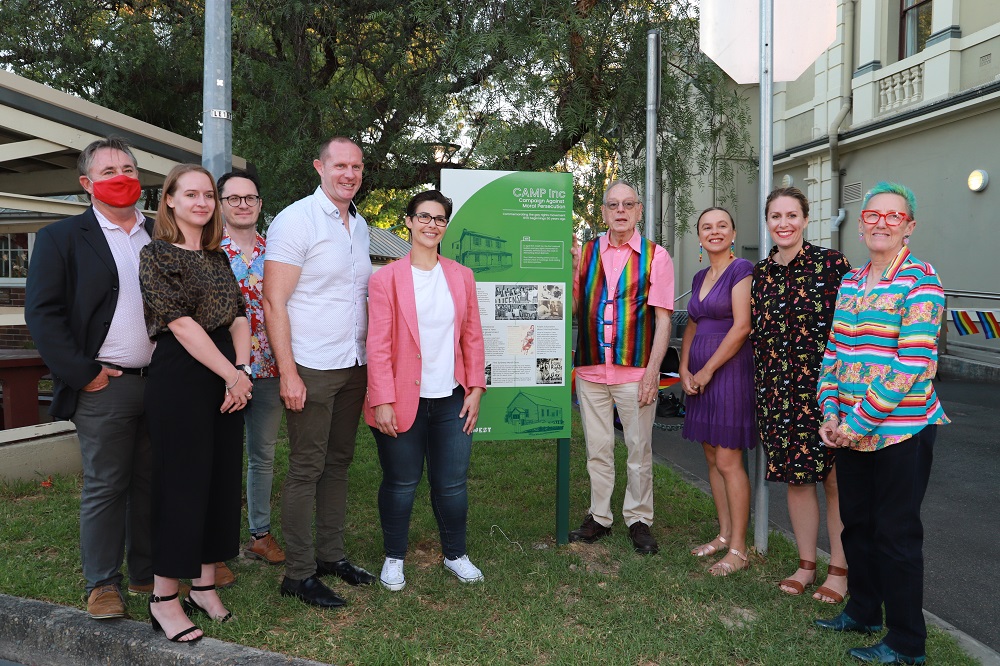CAMP (Campaign Against Moral Persecution)
On 16 February 2022, we unveiled signage installed outside the Balmain Town Hall at 370 Darling Street Balmain. The signage recognises CAMP Inc, one of the first gay and lesbian rights organisations who began the human rights movement for the LGBTQ community over 50 years ago.
CAMP Inc began with a small group of courageous women and men. They appeared in two Australian newspaper articles, on 10 and 19 September 1970. John Ware and Christabel Poll announced the founding the the Campaign Against Moral Persecution - known as CAMP Inc, or CAMP NSW. Long term Balmain resident Peter de Waal, a founding member of CAMP spoke about the difficulties they faced 50 years ago during oppressive times.

Background information from Mayor Councillor Darcy Byrne's Notice of Motion in May 2021 (PDF 165.9KB)
Speech delivered by Peter de Waal on 16 February 2022
Tonight, we meet on Wangal country, part of the Eora nation. Land that always was, always will be, and never ceded First Nation land.
I would like to pay my respect to elders’ past, present and those emerging. I’m delighted to share this space with Inner West Council Mayor, Darcy Byrne, Councillors, and friends gathered, at this 2022, Feel the Love, Inner West Council’s Mardi Gras celebration.
I'd like to thank the Mayor and councillors for this truly magnificent CAMP heritage plaque, and CAMP’s 50th anniversary mayoral minute. Both are generous gifts, to the LGBTQI+ community. Also, a big thank you to Inner West Council’s Amie Zar, Josie Leeson and Council’s LGBTQ Working Group for their work associated with this heritage plaque. A special thanks to Robyn Plaister and Robyn Kennedy for their contribution towards CAMP’s plaque.
The public announcement of the Campaign Against Moral Persecution, better known as CAMP, was in the Australian newspaper, on 10 September 1970. I want to acknowledge the founders of CAMP, Christabel Poll and John Ware. They became, so to speak, CAMP’s parents who later had offspring that went their own, different ways. Half a century ago, CAMP’s founding was in a very oppressive era, when, NSW police commissioner described homosexuality as ‘Australia’s greatest menace.’ Another commissioner, said, that homosexuals were a ‘cancer in the community.’ There was a specific NSW homosexual prison in Cooma.
So, CAMP existed among many foes, in a friendless era. Therefore ‘CAMPing’ in Balmain was so bold and daring! It's opposite Balmain Police Station, the Balmain Police Boy’s Club, near the local, but hostile, down the road, Returned Services League, and CAMP’s only friendly neighbour was the Balmain Fire Brigade. Others, including my beloved Peter Bonsall-Boone, and I, became CAMP foundation members in September 1970. Over time this small movement became national, grew, and expanded to what we know today, as the LGBTQI+ community.
At 393 Darling Street, across the street, is a large, gracious, two storey sandstone Colonial house, built by pioneer Colonial architect, Edmund Blacket. Blacket’s house became CAMP’s headquarters and clubrooms in early 1971. Every Saturday night there was a joyful dance to pay the $100 weekly rent. CAMP’s Balmain space became an early 1970s oasis for multitudes. A homosexual haven in a hostile, loveless, hateful, oppressive, alienating, society. It’s across the road where the first CAMP, October 1971, Ash Street, Sydney, demonstration was planned. That became the first lesbian and homosexual demonstration in Australia. Forty or fifty of us came out, on-masse, and were photographed publicly in that woeful oppressive, half-century ago, Australia. It was the first time, women-lesbians supported a male specific issue, namely homosexual law reform, when lesbian’s sexuality was not a crime.
The first national regular journal, CAMP’s, CAMP Ink, started in November 1970. It was written, produced, and posted from across the road in plain wrappers, to protect the recipient’s closeted lives. Numerous activist meetings were held by various CAMP interest groups at the clubrooms. Bernice and Ken Buckley from the NSW Council of Civil Liberties were legal observers, in case there was a police raid at CAMP’s first dance, here at the Balmain town hall, in early 1971.
Behind CAMP’s building, there was a large backyard where Sunday afternoon’s, not-for-profit, BBQs were held. For many it became a low-key, temporary closet exit, an oasis, and feeling at home, while meeting like-minded folk. CAMP supported segments of the ground-breaking 1972 ABC TV Chequerboard program being filmed in its backyard. In which lesbian couple Sue Wills and Gaby Antolovich and Bon and I appeared.
Finally, the CAMP heritage plaque and minute are wonderful additions to the existing seven Inner West Council’s rainbow seats, dedication to individual activists in Inner West Council’s area.
Thank you